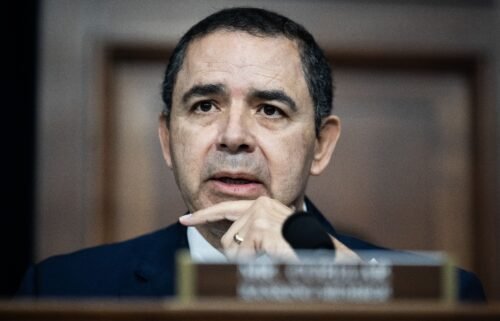‘A harsher, colder place’: How January 6 changed Congress and some members forever

By Lauren Fox, CNN
On January 6, 2021, Rep. Dan Kildee, a Democrat from Michigan, was prepared for a long day.
What he wasn’t prepared for was a year of recovery from trauma in his workplace, a building and institution he had grown up revering and what that day would come to mean for his relationships and future with colleagues across the aisle.
Kildee — along with dozens of other members and press — was initially trapped January 6 in the House chamber on the balcony overlooking the House floor. He was among the members instructing his colleagues to “take your pins off” in videos that surfaced from those frantic minutes, fearful that the mob would enter the chamber and immediately recognize them as members of Congress.
It wasn’t until days later, however, that Kildee realized he needed professional help. In the days after the insurrection, the constant video replays and footage served to re-traumatize him. Soon, he said, he found himself unable to focus, becoming short-tempered and struggling to rest. It was friends who eventually encouraged him to seek professional help. He’s now been seeing his therapist weekly for 11 months.
“One thing that struck me was if this mob was able to get to us, what would they have done to us? That was hard to think through,” Kidlee said.
“That initial trauma was dealing with the personal threat to myself, but also that something really valuable to all of us that I held in the highest regard — and that was democracy itself — was treated so poorly and was ransacked by people who obviously have no respect for what it stands for. “
Kildee’s story isn’t an isolated incident. In interviews with more than a dozen members about their experiences after that day, many recounted that the repercussions have changed the way they approach security, their mental health and even the way they interact with their colleagues — especially those who voted against certification of a fair and free election.
House Speaker Nancy Pelosi, members say, has been pivotal in encouraging her members to seek help and take care of themselves and their families if they need it. The spouses of members have forged relationships to try to make sense of and cope with the threats their loved ones now face, and new members have adjusted to the reality that this Congress — which was attacked just days into their service — has been irrevocably changed.
Rep. Sara Jacobs, a freshman Democrat from San Diego, was trapped in the gallery on January 6. It had been her first week in Congress.
Jacobs said she has leaned over the last year on the group of members who had been stuck with her that day, calling them a “lifeline.” The group is on a regular text chain, shares dinners and brunches and has held group therapy sessions to unpack their shared trauma.
For Jacobs, the challenge has been learning not only a new job, but how to operate in a Congress that many who have served for decades say is as volatile as they can remember.
“It’s all I’ve ever known is a Congress like this,” she said.
Jacobs’ experience was unique in that freshman orientation had happened shortly before January 6 and she’d gotten to know some of the Republican freshmen who’d gone on to vote against certifying the election. After the day they’d experienced, she had hoped many of them would change their minds.
“That night to still have folks not certify the election, that was hard,” she recalled.
It’s been a difficult year for many members, especially Democrats, who said in interviews that they have found it painful to manage with a competing narrative that’s emerged saying that what they experienced that day wasn’t that bad.
“I find the tolerance of some of my colleagues for rewriting what we lived through to be really hard to take,” said Sen. Sheldon Whitehouse, a Democrat from Rhode Island, about his year. “It’s not just the flagrant Trumpsters who lie without shame about what took place. It’s also the more decent and regular Republicans that hunker down and won’t call them out on it and leave the lies unchallenged. It makes it a harsher, colder place.”
Grappling with how to move forward with colleagues across the aisle has been one of the bigger challenges members have struggled with.
“Dealing with the nutty, goofy fringe of the GOP conference, I don’t even think about them. Perry, Boebert and Gosar … forget them,” Kildee said, referencing Republican Reps. Scott Perry of Pennsylvania, Lauren Boebert of Colorado and Paul Gosar of Arizona.
“But the biggest part of the last year for me is coming to peace that there is a large number of Republicans who went along with all of this because they thought it was in their political interests despite the fact that they knew it was a lie,” Kildee added.
In the Senate, eight Republicans voted against certifying the election: Sens. Tommy Tuberville of Alabama, Rick Scott of Florida, Roger Marshall of Kansas, John Kennedy of Louisiana, Cindy Hyde-Smith of Mississippi, Josh Hawley of Missouri, Ted Cruz of Texas and Cynthia Lummis of Wyoming. In the House, 139 Republicans voted to object to at least one state’s electoral results.
It’s part of the reason that lawmakers on both sides of the aisle say the House has endured a harsher and more volatile year, as bitter and nasty fights between both sides have spilled into public view on social media and in the very halls of the body. Fights over masks, metal detectors, vitriolic name calling and even an anime depiction of appearing to murder a colleague have all become the narrative for the House of Representatives.
In the Senate, members say they believe there has been more reconciliation and recovery, in part because of the GOP leader, Mitch McConnell of Kentucky, who has not embraced Trump since that day.
It’s a far different story from that of House Minority Leader Kevin McCarthy, a California Republican who decried the former President as responsible for the insurrection only to turn around weeks later and meet with him at Mar-a-Lago.
“The reality is we are still legislating regularly, and part of that is because when we came back into the chamber on the night of January 6, several members changed their [minds about their] votes. Sen. Romney gave a memorably forceful speech about the Constitution and democracy, and so did Mitch McConnell,” Democratic Sen. Chris Coons of Delaware said.
Many Republicans CNN spoke to downplayed the trauma of that day. Some said they had largely moved on and didn’t need additional help grappling with the ramifications. But others said they have worried about the impact the last year has had on their staffs.
Finding a way to work together
After the insurrection, Kildee said, he didn’t even want to look at colleagues who’d voted against certification, not to mention work with them, and finding a way through that became an intensive and important part of his therapy and recovery.
“At first, I was not able to interact or legislate with these people, but I felt like I was then dealing with this poison they brought to this place, and I was carrying that,” Kildee said. “My conclusion is I won’t think of them the same way, I won’t respect them … but I still have to work with people who were sent to Congress.”
Sen. Bob Casey, a Democrat from Pennsylvania, said he has also struggled to work with even his GOP colleagues from Pennsylvania. Eight out of nine of them voted against certification.
“It is very, very hard to do, and I have lost respect for them because of the way they voted that day. There are times when the interests of Pennsylvania have to be the primary focus, and I will continue to work with them on those priorities,” he said. “I am not going to put January 6 in the rearview mirror, and I never will.”
The reverberations of that day are still very much a practical concern, as well, for members. During a hearing Wednesday, US Capitol Police Chief Tom Manger told lawmakers that there had been nearly 10,000 threats against lawmakers in the last year, a startling record number that members say has affected the ways they go about their jobs.
“You are more aware,” Casey said.
“I am much more wary of people I don’t know,” Democratic Whip Dick Durbin of Illinois told CNN.
The-CNN-Wire
™ & © 2022 Cable News Network, Inc., a WarnerMedia Company. All rights reserved.



